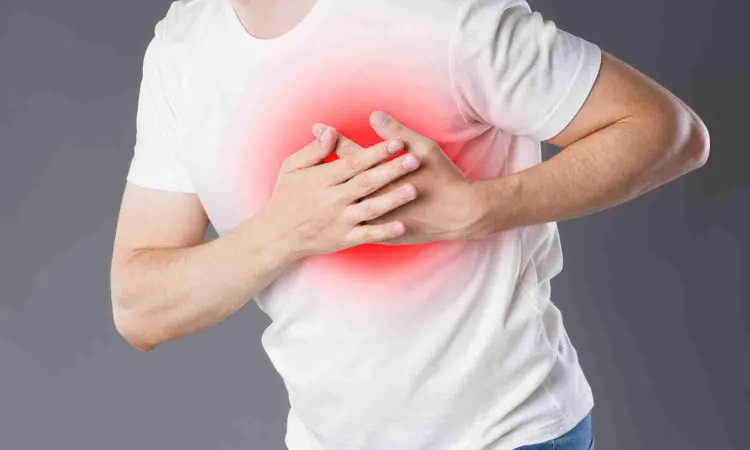- Home
- Medical news & Guidelines
- Anesthesiology
- Cardiology and CTVS
- Critical Care
- Dentistry
- Dermatology
- Diabetes and Endocrinology
- ENT
- Gastroenterology
- Medicine
- Nephrology
- Neurology
- Obstretics-Gynaecology
- Oncology
- Ophthalmology
- Orthopaedics
- Pediatrics-Neonatology
- Psychiatry
- Pulmonology
- Radiology
- Surgery
- Urology
- Laboratory Medicine
- Diet
- Nursing
- Paramedical
- Physiotherapy
- Health news
- Fact Check
- Bone Health Fact Check
- Brain Health Fact Check
- Cancer Related Fact Check
- Child Care Fact Check
- Dental and oral health fact check
- Diabetes and metabolic health fact check
- Diet and Nutrition Fact Check
- Eye and ENT Care Fact Check
- Fitness fact check
- Gut health fact check
- Heart health fact check
- Kidney health fact check
- Medical education fact check
- Men's health fact check
- Respiratory fact check
- Skin and hair care fact check
- Vaccine and Immunization fact check
- Women's health fact check
- AYUSH
- State News
- Andaman and Nicobar Islands
- Andhra Pradesh
- Arunachal Pradesh
- Assam
- Bihar
- Chandigarh
- Chattisgarh
- Dadra and Nagar Haveli
- Daman and Diu
- Delhi
- Goa
- Gujarat
- Haryana
- Himachal Pradesh
- Jammu & Kashmir
- Jharkhand
- Karnataka
- Kerala
- Ladakh
- Lakshadweep
- Madhya Pradesh
- Maharashtra
- Manipur
- Meghalaya
- Mizoram
- Nagaland
- Odisha
- Puducherry
- Punjab
- Rajasthan
- Sikkim
- Tamil Nadu
- Telangana
- Tripura
- Uttar Pradesh
- Uttrakhand
- West Bengal
- Medical Education
- Industry
Short-Term Cold Spells Increase Risk of Heart Attacks, Swedish Study Finds

Sweden: Researchers reported a rise in hospital admissions for heart attacks following exposure to lower air temperatures and cold spells.
According to the findings presented at the European Society of Cardiology Congress, the increase in hospitalizations was delayed, peaking 2 to 6 days after exposure to cold weather. The findings were also simultaneously published in the Journal of the American College of Cardiology.
Lower air temperatures and cold spells have been linked to a heightened risk of various diseases. However, the short-term impact of these cold conditions on myocardial infarction (MI) is still not fully understood. To fill this knowledge gap, Wenli Ni, Department of Clinical Sciences, Danderyd Hospital, Karolinska Institutet, Stockholm, Sweden, and colleagues aimed to determine the short-term effects of lower air temperature and cold spells on the risk of hospitalization for MI in Sweden.
For this purpose, the researchers conducted a population-based nationwide study, examining 120,380 MI cases admitted to hospitals in Sweden during the cold season (October to March) from 2005 to 2019. Daily mean air temperatures were estimated at a 1 km² resolution using machine learning, and individual exposure indicators were created based on the percentiles of daily temperatures experienced by individuals within the same municipality to account for geographic adaptation.
Cold spells were defined as periods of at least two consecutive days where the daily mean temperature fell below the 10th percentile of the temperature distribution for each municipality. Short-term effects of lower air temperature and cold spells on total MI, non-ST-segment elevation myocardial infarction (NSTEMI), and ST-segment elevation myocardial infarction (STEMI) were assessed using a time-stratified case-crossover design. The design involved conditional logistic regression models with distributed lag nonlinear models, examining immediate effects (lag 0 to 1 days) and delayed effects (lag 2 to 6 days).
Based on the study, the researchers reported the following findings:
- A decrease of 1-U in percentile temperature at a lag of 2 to 6 days was significantly associated with increased risks of total MI, NSTEMI, and STEMI, with ORs of 1.099, 1.110, and 1.076, respectively.
- Cold spells at a lag of 2 to 6 days were significantly associated with increased risks for total MI, NSTEMI, and STEMI, with ORs of 1.077, 1.069, and 1.095, respectively.
- Lower air temperature and cold spells at a lag of 0 to 1 day were associated with decreased risks for MI.
"This nationwide case-crossover study demonstrates that short-term exposure to lower air temperatures and cold spells is linked to a heightened risk of hospitalization for myocardial infarction within a lag of 2 to 6 days," the researchers concluded. "The impact of weather on cardiac risk requires further exploration."
Reference:
Ni W, Stafoggia M, Zhang S, Ljungman P, Breitner S, Bont J, Jernberg T, Atar D, Agewall S, Schneider A. Short-Term Effects of Lower Air Temperature and Cold Spells on Myocardial Infarction Hospitalizations in Sweden. J Am Coll Cardiol. 2024 Sep 24;84(13):1149-1159. doi: 10.1016/j.jacc.2024.07.006. Epub 2024 Sep 1. PMID: 39230547.
Dr Kamal Kant Kohli-MBBS, DTCD- a chest specialist with more than 30 years of practice and a flair for writing clinical articles, Dr Kamal Kant Kohli joined Medical Dialogues as a Chief Editor of Medical News. Besides writing articles, as an editor, he proofreads and verifies all the medical content published on Medical Dialogues including those coming from journals, studies,medical conferences,guidelines etc. Email: drkohli@medicaldialogues.in. Contact no. 011-43720751


